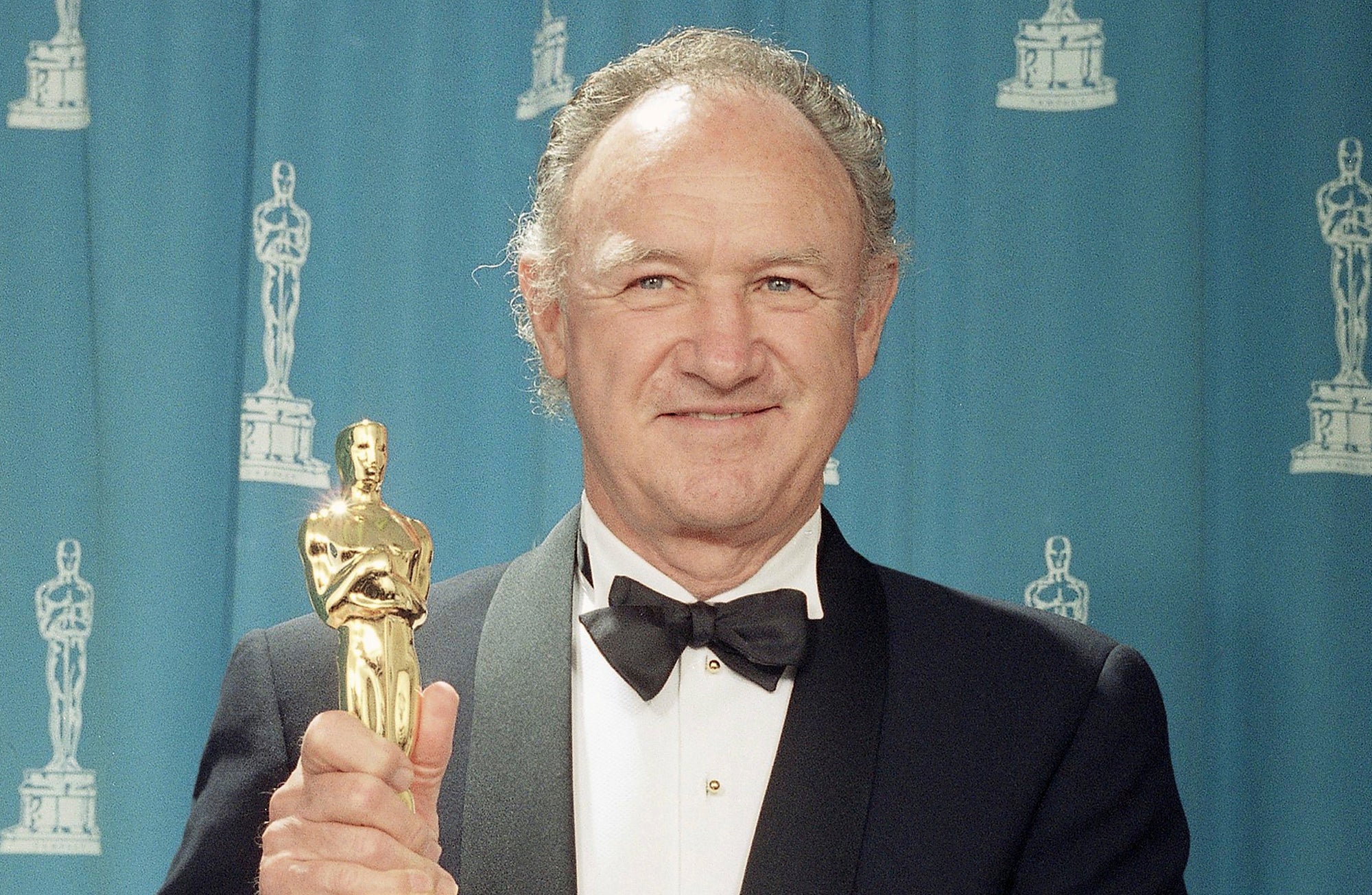Gene Hackman: The Shocking Final Revelation Behind His Hollywood Departure and Mysterious Death
On February 26, 2025, the world awoke to shocking news: legendary Oscar-winning actor Gene Hackman and his wife, Betsy Arakawa, had been found dead in their Santa Fe home, alongside one of their beloved German Shepherds.
Investigators quickly labeled their deaths suspicious, deepening the mystery surrounding the notoriously private actor, who had quietly left Hollywood two decades earlier.
The shocking discovery became even more perplexing when authorities revealed that the couple had been deceased since February 17, exactly one week after Hackman gave his last-ever interview—a rare candid conversation that now appeared hauntingly prescient.
Gene Hackman’s Haunting Last Interview
In this final interview, conducted just one week before his death, Hackman shared rare insights into his abrupt exit from acting, confirming rumors and shedding new light on his true motivations.
“I’ve never regretted walking away,” he confessed, adding, “that stress test saved my life—or at least gave me 20 more years of it.”
This revelation hinted at deeper, unseen pressures that prompted one of Hollywood’s most respected actors to turn his back on stardom.
But what exactly was Gene Hackman hiding all these years? And why did his departure remain shrouded in secrecy until his final days?
Early Life: Tragedy and Determination
Eugene Allen Hackman, born on January 30, 1930, in San Bernardino, California, grew up amid hardship and instability.
At 13, he experienced profound abandonment when his father abruptly left the family, an emotional wound that would deeply influence his life and career.
Hackman later described that moment of abandonment, recalling his father driving away as he played in the street, a visual memory burned into his psyche.
Tragedy continued to stalk Hackman when, in 1962, his mother died tragically in a house fire after accidentally igniting her mattress with a cigarette.
These early traumas, combined with his self-confessed rebellious nature, set the stage for a life of complicated relationships and intense performances.

Hackman’s journey took a pivotal turn when, at 16, he lied about his age to join the Marines, where he served four challenging years. “I was not a good Marine,” he later admitted, citing struggles with authority—a theme that resurfaced throughout his Hollywood career.
Struggles on the Path to Stardom
After leaving the military, Hackman briefly studied journalism before enrolling at Pasadena Playhouse, where classmates famously voted him and fellow student Dustin Hoffman “least likely to succeed.”
Undeterred, Hackman relocated to New York, balancing odd jobs, including working as a doorman, with auditions and acting classes.
A chance encounter with a former Marine drill instructor who insulted him on sight only hardened Hackman’s resolve. “I wasn’t going to let those guys get me down,” he recounted.
Determined, he eventually landed small roles before his breakthrough at age 37 as Buck Barrow in “Bonnie and Clyde” (1967), a performance earning him his first Oscar nomination.
Hackman’s relentless perseverance had finally paid off, setting him apart as an unconventional Hollywood star whose career was about substance rather than style.
Hollywood’s Reluctant Icon
In 1971, Hackman cemented his place in Hollywood history with his portrayal of detective Jimmy “Popeye” Doyle in “The French Connection,” a role initially rejected by director William Friedkin.

The film, famous for its gritty realism, won Hackman his first Oscar, launching him into mainstream fame.
Hackman’s disdain for Doyle’s troubling morality, however, underscored his tense relationship with Hollywood, which would recur throughout his career.
Despite frequent clashes with directors and colleagues, including notably tense confrontations with John Travolta and Wes Anderson, Hackman’s professionalism and dedication to authenticity remained unwavering.
The actor’s broad range, from tense dramas like “Mississippi Burning” to comedic roles in “Young Frankenstein” and “The Royal Tenenbaums,” showcased a versatility rare among his contemporaries.
Yet, behind the scenes, Hackman’s personal life remained troubled, marked by financial instability, a volatile temper, and an uncomfortable relationship with fame.
The Hidden Struggles
By the late 1970s, despite his success, Hackman faced severe financial pressures from extravagant spending, tax troubles, and debt.
He humorously described borrowing his daughter’s battered car to attend auditions discreetly, reflecting a period when he accepted almost any role out of necessity rather than artistic desire.

His volatile temper, which had earned him the nickname “Vesuvius” among industry insiders, occasionally spilled into public incidents, notably a fistfight in 2001 at age 71 and another confrontation at 82, involving a homeless man who verbally harassed his wife.
In 1986, Hackman’s marriage to first wife Fay Maltese dissolved after 30 years, a casualty of his relentless commitment to work.
“Actors become very selfish,” he candidly explained, admitting that the financial and professional allure had often overshadowed his familial responsibilities.
However, in his later years, marriage to pianist Betsy Arakawa, 32 years his junior, brought some much-needed stability.
Health Warnings and the Decision to Retire
Despite remarkable physical fitness, age inevitably caught up with Hackman. In 1990, a severe episode of angina required an emergency angioplasty—a health scare that forced him to reconsider his intense lifestyle.
Yet Hackman continued acting vigorously, securing his second Oscar for “Unforgiven” in 1992.
Further warnings, including a serious bicycle accident in 2012, heightened his vulnerability. By the early 2000s, the cumulative physical toll of acting had become undeniable.

Hackman openly discussed his concerns for his family’s security, revealing to Larry King, “I want to make sure my wife and my family are taken care of.”
The final straw came after his last film, the critically disappointing “Welcome to Mooseport” (2004). Though he initially hesitated to announce retirement publicly, Hackman confirmed his permanent departure from acting in 2008.
The decision wasn’t driven by professional dissatisfaction but by an explicit medical ultimatum—a heart condition revealed by doctors that necessitated removing stress from his life entirely.
Hackman’s New Life in Santa Fe
Relocating to Santa Fe with Betsy, Hackman embraced a quieter existence, pursuing passions long overshadowed by Hollywood’s glare.
He co-authored novels alongside underwater archaeologist Daniel Lenihan and later wrote independently, finding fulfillment without the pressures of filmmaking.
Local Santa Fe residents appreciated Hackman’s unpretentious nature, recalling his genuine support for the community through generous purchases from local businesses and regular appearances at art exhibitions.
Hackman, free from Hollywood’s demands, reveled in anonymity, finding joy in cycling, painting landscapes, and engaging with the local art community.

His fondness for simplicity and privacy became evident in everyday activities, such as weekly Pilates sessions, casual bike rides, and his penchant for buying watches from local businesses for friends and family.
Final Reflections and Legacy
A week before his death, in his final public interview, Hackman clarified the motivation behind his retirement: health, not disillusionment, had prompted his abrupt departure. He confirmed what many had suspected—he had chosen life over fame, peace over public acclaim.
“Hollywood evolves on the surface,” Hackman explained, “but fundamentally, the things I disliked—the politics, the waiting, the fuss—never changed.”
Despite his enduring legacy as one of cinema’s greats, he hoped to be remembered for his work rather than his personal life.
Ultimately, Hackman’s passing marked the end of an era. His decision to leave Hollywood behind for a quiet life underscores a universal truth: sometimes, knowing when to walk away is the bravest act of all.
In his words, “I hope people remember the characters, not the man. The characters were interesting—I was just the vessel.” Gene Hackman’s life and death remind us that the true art of living sometimes means knowing when it’s time to let go.
In memory of Gene Hackman, the actor who chose life over legacy.


